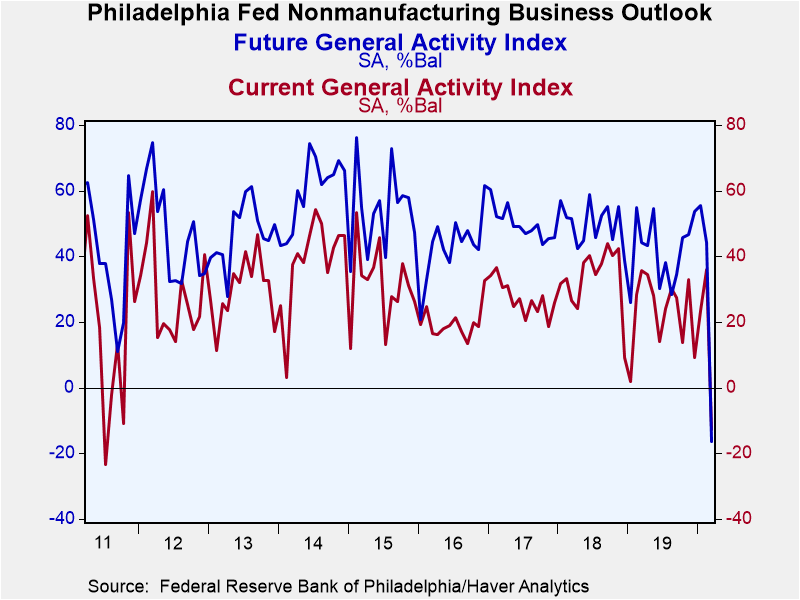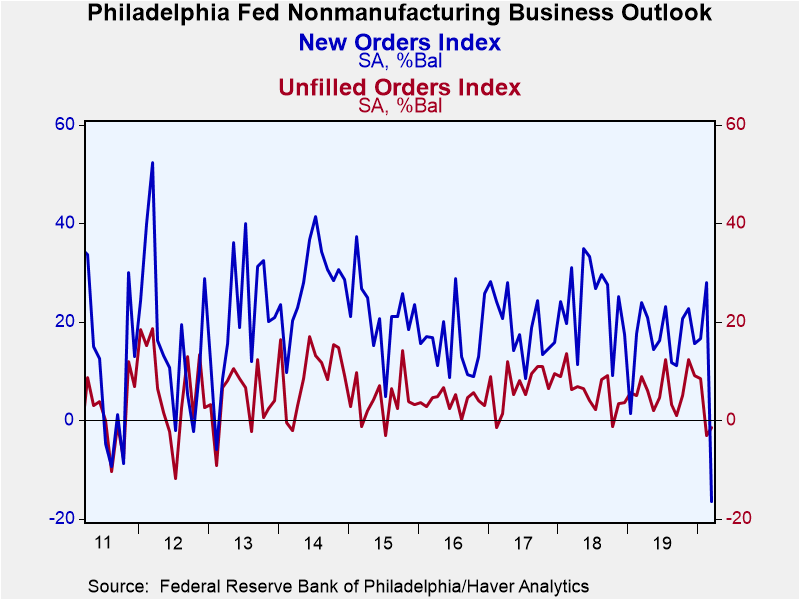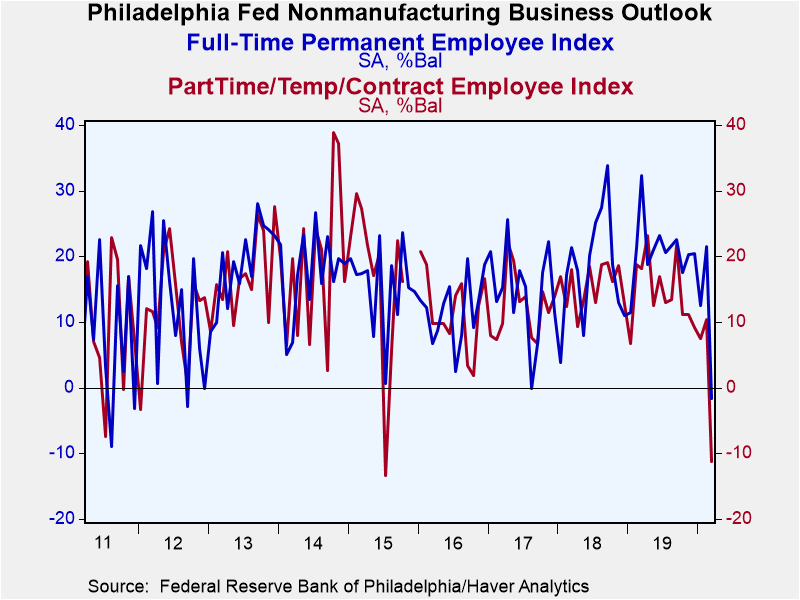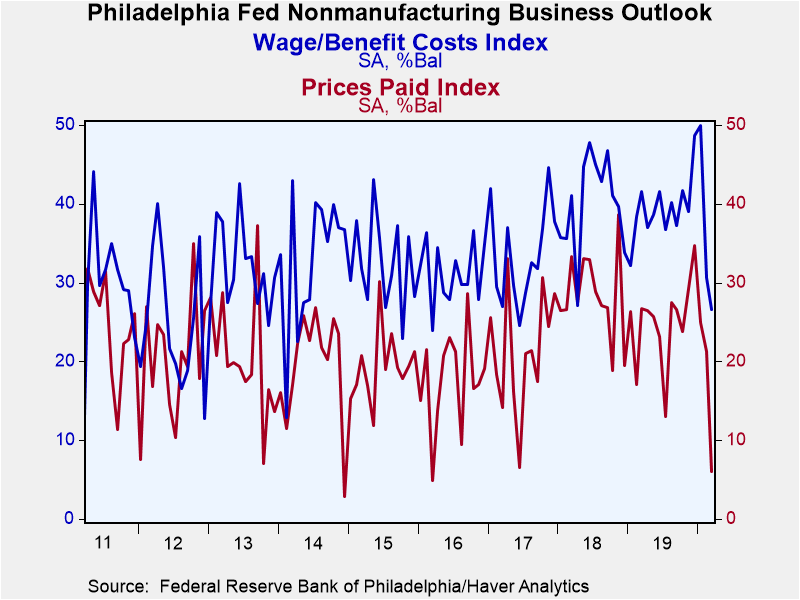 Global| Mar 24 2020
Global| Mar 24 2020Philadelphia Fed Nonmanufacturing Business Activity Collapses
by:Tom Moeller
|in:Economy in Brief
Summary
The Federal Reserve Bank of Philadelphia reported that its Nonmanufacturing Business Index of current general activity at the company level dropped to -12.8 during March after rising to 36.1 in February. The index of expected general [...]
The Federal Reserve Bank of Philadelphia reported that its Nonmanufacturing Business Index of current general activity at the company level dropped to -12.8 during March after rising to 36.1 in February. The index of expected general activity similarly declined to -16.3 from 44.2.
Components of the company general activity index were uniformly weak this month. New orders figures collapsed to -16.4. A reduced 17% of firms reported improved new orders while a greatly increased 33% reported a decline. The sales or revenue series fell m/m to -4.9, the lowest level in over four years. The index of unfilled orders improved but the inventories measure cratered.
The labor market measures retreated in March. The full-time permanent employment measure fell to -1.7, indicating job cutbacks at the greatest rate since 2012. A greatly lessened 19% of firms reported increased hiring while a surging 20% reported a decline. Part-time/temporary employee hiring also weakened sharply to a roughly five-year low. The average workweek reading similarly collapsed as did the wages & benefits measure.
Pricing power was constrained. The index of prices paid fell sharply to 6.0, down from 34.7 just three months ago. A greatly lessened 15% of firms reported higher prices while an increased nine percent indicated a decline, the most in five years. Prices received also were significantly weakened.
The capital expenditure measures fell sharply. The physical plant measure declined to the lowest level since October. The equipment & software expenditure reading also weakened to a four-month low.
The Philadelphia Fed figures are diffusion indexes which are calculated by subtracting the percent of respondents reporting decreases in business activity from those reporting improvement. So, readings above zero indicate more positive than negative responses. These indexes have a good correlation with growth in the series covered. The data are available in Haver's SURVEYS database.
| Federal Reserve Bank of Philadelphia: Nonmanufacturing Business Outlook Survey (Diffusion Index, SA) | Mar | Feb | Jan | Mar'19 | 2019 | 2018 | 2017 |
|---|---|---|---|---|---|---|---|
| General Activity - Company | -12.8 | 36.1 | 23.5 | 35.7 | 23.4 | 33.5 | 27.2 |
| New Orders | -16.4 | 28.1 | 16.6 | 24.0 | 16.7 | 24.2 | 19.1 |
| Sales or Revenue | -4.9 | 39.8 | 29.2 | 41.0 | 24.0 | 30.8 | 27.8 |
| Inventories | -1.7 | 5.6 | 2.6 | 9.7 | 4.0 | 5.2 | 3.8 |
| Number of Full-Time Permanent Employees | -1.7 | 21.5 | 12.5 | 32.3 | 20.9 | 18.1 | 14.8 |
| Part-Time/Temporary/Contract Employees | -11.2 | 10.4 | 7.5 | 18.1 | 14.6 | 15.5 | 12.3 |
| Prices Paid | 6.0 | 21.3 | 25.0 | 26.7 | 25.0 | 28.3 | 21.4 |
| Wage & Benefit Costs | 26.6 | 30.7 | 49.9 | 41.6 | 39.4 | 40.1 | 33.5 |
| Expected General Activity - Company | -16.3 | 44.2 | 55.6 | 44.2 | 41.7 | 49.9 | 49.8 |
Tom Moeller
AuthorMore in Author Profile »Prior to joining Haver Analytics in 2000, Mr. Moeller worked as the Economist at Chancellor Capital Management from 1985 to 1999. There, he developed comprehensive economic forecasts and interpreted economic data for equity and fixed income portfolio managers. Also at Chancellor, Mr. Moeller worked as an equity analyst and was responsible for researching and rating companies in the economically sensitive automobile and housing industries for investment in Chancellor’s equity portfolio. Prior to joining Chancellor, Mr. Moeller was an Economist at Citibank from 1979 to 1984. He also analyzed pricing behavior in the metals industry for the Council on Wage and Price Stability in Washington, D.C. In 1999, Mr. Moeller received the award for most accurate forecast from the Forecasters' Club of New York. From 1990 to 1992 he was President of the New York Association for Business Economists. Mr. Moeller earned an M.B.A. in Finance from Fordham University, where he graduated in 1987. He holds a Bachelor of Arts in Economics from George Washington University.
More Economy in Brief
 Global| Feb 05 2026
Global| Feb 05 2026Charts of the Week: Balanced Policy, Resilient Data and AI Narratives
by:Andrew Cates










